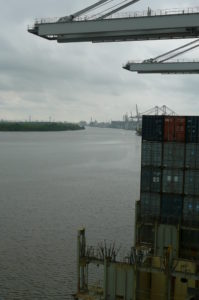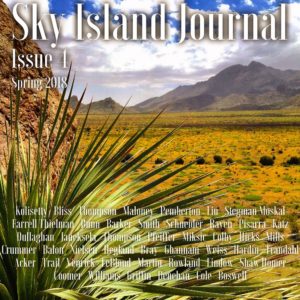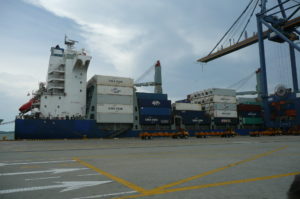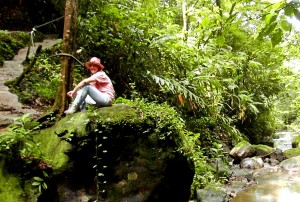Leaving one ship and waiting for another to take me across the Atlantic, I spent a few unexpected days in Savannah, Georgia. Excerpted from Journey to the Joie de Vivre: Lessons to be Learned on the Road if We Look for Them.
I left my hat behind on board. Is this another of the depredations of age, to litter the planet with our detritus as we wander half-witted along?
I didn’t get ashore until 9 o’clock last night, but I was lucky to grab the taxi that had just delivered my replacement passengers from the airport. The cab driver, a large man with a slow drawl, sympathized and then began to intone facts about the city. I had little patience for all that and have to admit that I interrupted him to say I was tired, annoyed at myself and hurting, and that I probably wouldn’t have time to enjoy much of Savannah. In the same slow drawl, he said, “Well, people around you can’t feel your pain, so we can’t know, can we?” Humbled, I apologized. Lesson for today.
My hotel room looks like a post-Civil War bordello with high, velvet-tufted headboards, flocked carpeting, dark satin curtains, a plastic snakeskin-covered chair, a mirror the size of a ’57 Pontiac, two oyster shell bathroom sconces made doubly hideous by the mirror behind them, furniture designed to look like old sea chests and an absolutely bewildering array of electronics on the large granite-topped desk (I called the hotel engineer to come disconnect everything). Evian water is available for five dollars a bottle. The “pillow-top” bed was so soft that I ended up sleeping on the floor. I piled up the plastic bed cover and two fake fur throws and stretched out with a pretty comfortable pillow and slept quite well, actually, but this morning I reported to the desk that there was no way I could continue to stay in a room that didn’t have a decent mattress and that I had requested an orthopedic mattress when I made my reservation.
The very nice young woman at the desk went to work. She searched nearby hotels to see if there was a room with an orthopedic mattress. Then she searched nearby hotels to see if they had extra beds in housekeeping and finally she came up with a roll-away bed that I can use here in the same room that’s somewhat firmer than the wallowy mattresses on the two double beds, although hardly orthopedic. I was supposed to have a river view, but because I arrived a day early (unbelievable – I had no idea what the date was), I’m stuck now on the ground floor, looking out at a parked SUV and, beyond that, some live oaks and shrubbery along the boulevard. It’s a pretty day.
After ten years since my last visit, I find myself feeling a little intimidated by the United States. I went out this morning to walk around in search of a bank where I could change dollars back into euros. Nothing doing. Not unless you have an account. But at the bank I asked for a little café where I could find something light and perhaps a glass of wine. The town is crawling with restaurants, most of them pubs or hamburger joints smelling of fries. But as I was following directions to another hotel restaurant I found a little Japanese place where I had a very nice sushi and sashimi lunch and part of a Kirin beer (served in a 16-ounce bottle and there was no way I was going to get through all that).
Back in my room, waiting to lie down and rest for a while. I have to keep ice packs cold in an ice bucket, , since there’s no minibar in this room. I thought I had arranged for every single room on this itinerary to have a minibar, as well as an orthopedic mattress, but I seem to have failed on both counts in this place, and it’s hard to imagine they would charge me full price for sleeping on the floor last night, but they might. I wish I didn’t have two more nights to stay here, but maybe tomorrow I can get out and do a little horse-drawn carriage tour of the city and get down to the riverfront. There is certainly no view from here.
Savannah is a walking city, with broad boulevards divided by wide, lushly planted parks, no commercial clutter to offend the eye and only bevies of tourists in their shorts and walking ténis. Clean. Talking pedestrian crossing controls. Brick-lined walks. Only one beggar in all the blocks I walked! The legions of unemployed are hidden away. In a pharmacy where I sat down to wait for some information, I asked a broad black woman if there was a restroom, and she curled her lower lip contemptuously and shook her head. “Not in here. Try the Starbucks across the street.” Which I did, and desperately wished I could still drink coffee – the aroma was so overwhelming! I learned that there was a 5-digit punch code – changed regularly – to get into the ladies’ room. For “express check-out” at the pharmacy I needed personal help – I’d never used one before. Everyone is super-friendly, though. It’s easy to interact with people with openness and humor. Deciding to try my luck at a jewelry store, I was served by an attendant who had lived in China for six years and taken away as her “souvenir” an adopted little girl. How lovely! She despaired at the provincialism of many of her acquaintances who have never been out of Georgia. My Costa Rican passport had opened the door to that conversation, and it was delightful to connect with her – she found the perfect little earrings and a shy bangle that will make me feel a little dressier in the evenings, as I’m wandering around Europe.
This morning I learned that the port agent had been unable to locate my hat, so I had to go off in search of another one. I’ve also managed to misplace my comb, so yet another errand to do. The desk suggested I hire a pedicab, which turned out to be a great idea, mine pedaled by a young college graduate named Stefan, who led me to the perfect store for the hat, then to the same pharmacy I’d been to yesterday, and finally on a wonderful tour of the old city – elegant period homes and historic public buildings all lining a bewildering array of parks filled with live oaks dripping with Spanish moss. It was charming. The pedaler was charming. At the end she said she’d enjoyed “hanging out” with me. I returned the compliment! She dropped me by an elevator down to River Street, where I asked the first person I saw to recommend a place where I could get a salad and a glass of wine, which turned out to be a Greek café right behind him. Fisherman’s salad, house Chardonnay and a nice chat with two chubby older ladies (older than me?) who were on a bus tour from Indiana (!).
Tomorrow morning, I board my next ship and all this hopping about from place to place will stop for 17 days. The Atlantic!
Preparing to leave the United States again after such a long absence, I reflect that Savannah has certainly been a soft landing (it sure beats the Miami airport). The only exception was Homeland Security, what civilized people elsewhere call Immigration and Customs. Because I had to leave my cabin early so that the steward could clean it for the next passengers, I waited in the E Deck lounge where I knew the officials would be gathering. They crowded the room in their black uniforms with their side-arms and shaved heads and stiff military bearing, and they were courteous, but officious as hell. The kid in charge – I say “kid’” because he couldn’t have been over 30 – was wearing shiny black gloves that looked like something out of a sadomasochism catalog. He was just a little young for his job, and so a little extra authoritarian. With a touch of irony, I answered all his questions with the final word, “Sir.” The Coast Guard guys, who really are military, were much more relaxed and friendly. One found the phone number of my hotel on his cell phone, and the other, so as not to disturb me on the sofa, did his paperwork at the coffee table on his knees. As I was released to go, I leaned over and whispered in his ear, “You’ve been such a gentleman, you can get off your knees now.”
Copyright © Sandra Shaw Homer, 2016

Photo by SSH





